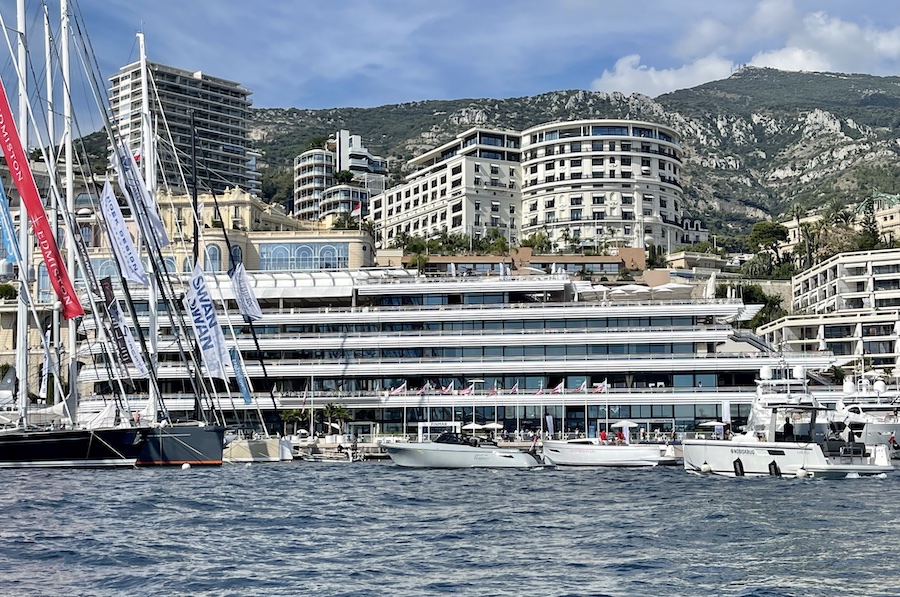Last week’s La Belle Classe Superyacht Symposium at the Monaco Yacht Club put emphasis on the latest ecological developments in the sector while addressing the thorny issue of yachting and the environment.
The Yacht Club de Monaco hosted the La Belle Classe Superyacht Symposium on 23rd February.
Over its 15-year history, the event has morphed into a sounding board to discuss the most pressing issues and developments in the yachting industry. It is organised under the Monaco Capital of Advanced Yachting umbrella and brings together key players, including owners, captains, and suppliers. This year, its focus was squarely on how to move the industry toward more eco-friendly practices.
“The Yacht Club de Monaco’s unique and neutral position enables it to bring those involved across the industry together to analyse the situation and propose concrete solutions,” said Bernard d’Alessandri, General Secretary of the Yacht Club de Monaco and President of the Cluster Yachting Monaco, at the event. “You all coming here this evening reflects everyone’s involvement, which is essential if we are going to shift the goal posts.”
A thriving industry
Orders for new boats are off the charts, with 7% growth in 2023 and 648 yachts over 30 metres currently under construction.
“The shipyards have full order books and some shipyards have already sold yachts for delivery in 2028,’’ said Merjin de Waard, the founder of SuperYacht Times and a board member of the Superyacht Life Foundation, who then went on to explain, “New yacht sales dropped 29% in 2022 compared to 2021, however 2022 was still the second-best year (after 2021) of the last 10 years with 221 new yacht sales.”
Though the industry is clearly thriving, it has a certain perception issue, in that people look quite negatively upon superyachts as privileged polluters. The industry is making attempts to clean up its act, and a raft of environmental regulations coupled with international awareness is taking hold. Many of those in the sector are now actively looking at ways to improve, rather than playing catch up.
ESG objectives at the fore
To achieve this, industry leaders are looking at specific environmental, social and governance (ESG) objectives to support the industry in its transition.
“The ESG strategy promotes commitment and action towards decarbonisation and can help the superyacht industry meet the growing compliance demands of banks, insurers and legislators that is increasingly driving the licence to operate,” said Captain Nigel Marrison, the founder of Blue ESG.
The yachting industry’s new goal of making ocean protection a priority has turned the focus inward.
Nicolas Mior, the manager of Jutheau Husson Yachting, thinks that the insiders need to drive the change, saying, “Even though the yachting industry has a small impact on the planet in terms of CO2 emissions, these players have a big responsibility, particularly in image terms; they must be drivers and leaders to progress the technologies and habits of tomorrow, to raise public awareness and make the maritime world more eco-friendly.”
Boat builders and engineers are rethinking new builds and steering them towards more efficient propulsion systems, such as hybrids as well as using zero-waste construction techniques, but what about the ones already built?
Super yachts are estimated to emit five million tons of CO2 annually, a very small 0.3% of the maritime sector’s total emissions, but the industry is hoping to shave off even more. Converting to new hybrid engines, using electricity and methanol, or ones running solely on methanol, are a popular idea for the future.
“Yachts must be the drivers of green innovation by developing truly sustainable footprints by optimising energy use and efficiency, researching sustainable fuel options and adopting new technologies. Methanol has the potential to become a major fuel source for the maritime industry with forecasts predicting that by 2050, 40% of its fuel will be methanol,” said Daniel Chatterjee, Director of Sustainability Technology Strategy and Regulatory Affairs at Rolls-Royce.
Another solution is going back to the industry’s roots and constructing more sailing yachts, the obvious advantages being that wind propulsion is free and clean.
These kinds of ideas will set the yachting sector down the path those at La Belle Classe hope will alter its image, whilst also doing right by the planet.
Captain Sean Meagher of Latitude and a Captains’ Club member said, “We have the potential to change the face of the industry, to show we are not all about excess and frivolity, but an industry of innovation, altruism and passion. To do that, we need to tell the stories of vessels and their owners that do make the world a better place.”
Sign up for the Monaco Life newsletter. For the latest news, follow us on Facebook, Twitter, and Instagram.
Photo by Monaco Life
